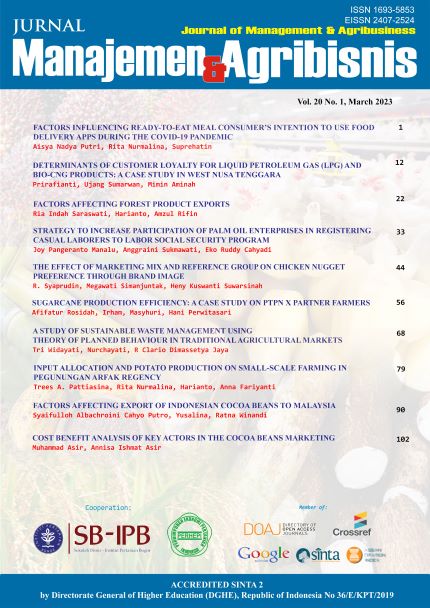Determinants of Customer Loyalty For Liquid Petroleum Gas (LPG) and Bio-Cng Products: A Case Study in West Nusa Tenggara
Abstract
One of the new renewable energy that can replace Liquid Petroleum Gas (LPG) is by maximizing the utilization of Biogas which modifies it to become Bio-Compressed Natural Gas or Bio-CNG on a commercial scale, especially for cooking. This study aims to answer two main objectives. The first is to find out the loyalty of LPG customers, the level of interest in Bio-CNG products to commercial sector business actors, and the second is to find out market testing that is influenced by price, product quality, and service quality on interest in buying Bio-CNG. The research was conducted from January to March 2022. The data collected in this study were primary data obtained from an Indonesian-language questionnaire survey which was distributed via the Google form link using the Ordinal scale. The sampling method (respondents) used was purposive sampling. Data is processed and analyzed using Logistic Regression Analysis. The research results obtained 100 respondents and showed that all variables had a significant influence on Horeka's interest in switching to using Bio-CNG. This research provides an overview and insight into the factors that influence the interest in buying Bio-CNG products among hospitality businesses. This research provides an overview and insight into the factors that influence the interest in buying Bio-CNG products among hospitality businesses. As consumers or in this research, hospitality business actors, they want to get good service from providers or sellers of Bio-CNG fuel products. As a provider of Bio-CNG fuel products, of course, you have to think about the quality of its service to hospitality businesses.
Keywords: Bio-CNG, customer loyalty, market tests
Authors
Authors who publish with this journal agree to the following terms:
- Authors retain copyright and grant the journal right of first publication with the work simultaneously licensed under a Creative Commons Attribution License that allows others to share the work with an acknowledgement of the work's authorship and initial publication in this journal.
- Authors are able to enter into separate, additional contractual arrangements for the non-exclusive distribution of the journal's published version of the work (e.g., post it to an institutional repository or publish it in a book), with an acknowledgement of its initial publication in this journal.
- Authors are permitted and encouraged to post their work online (e.g., in institutional repositories or on their website) prior to and during the submission process, as it can lead to productive exchanges, as well as earlier and greater citation of published work (See The Effect of Open Access).

